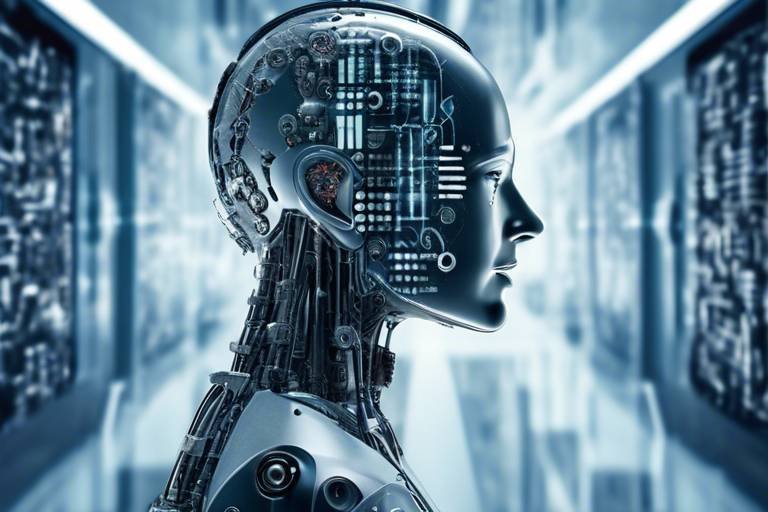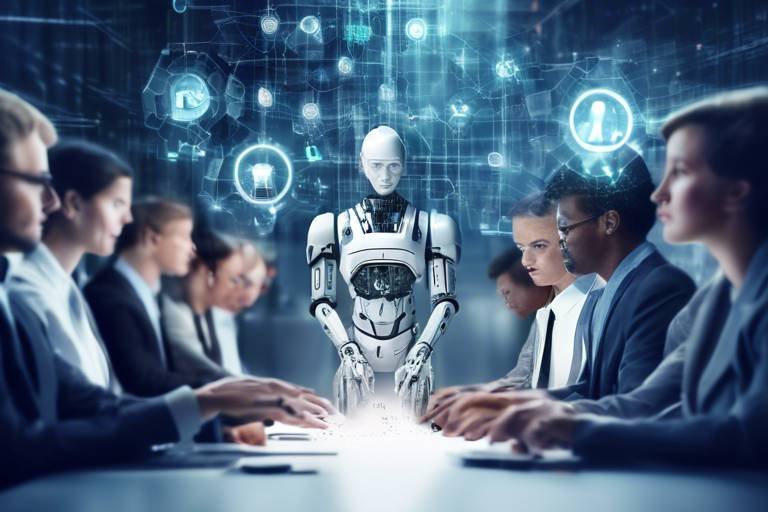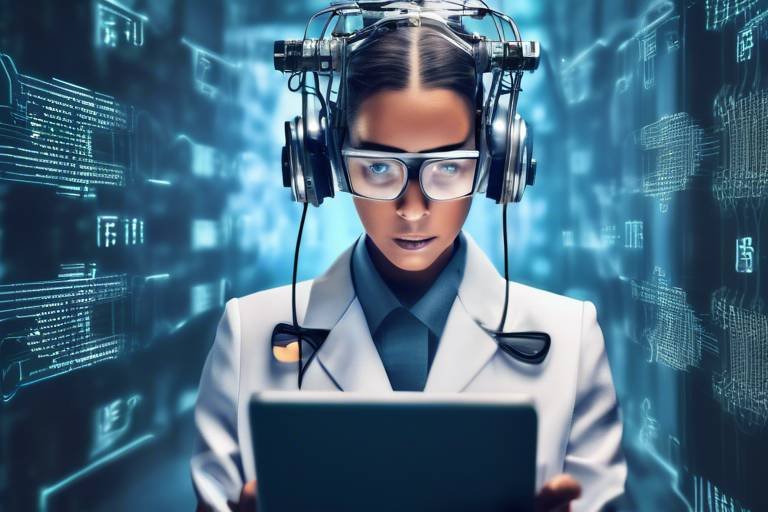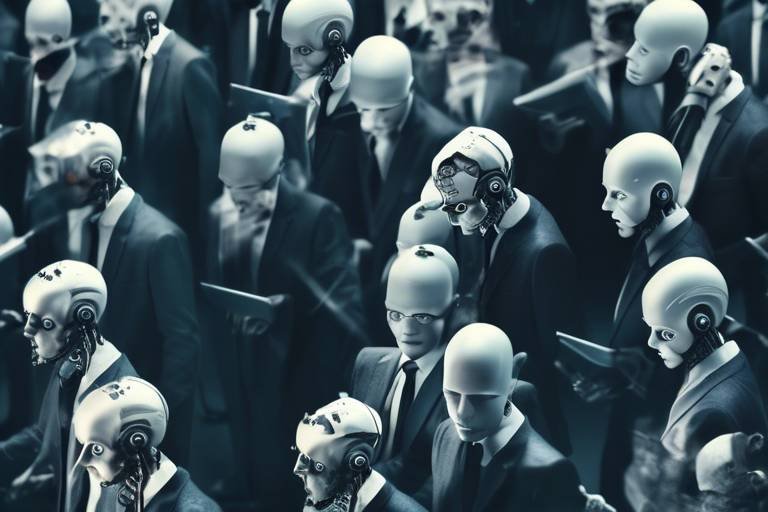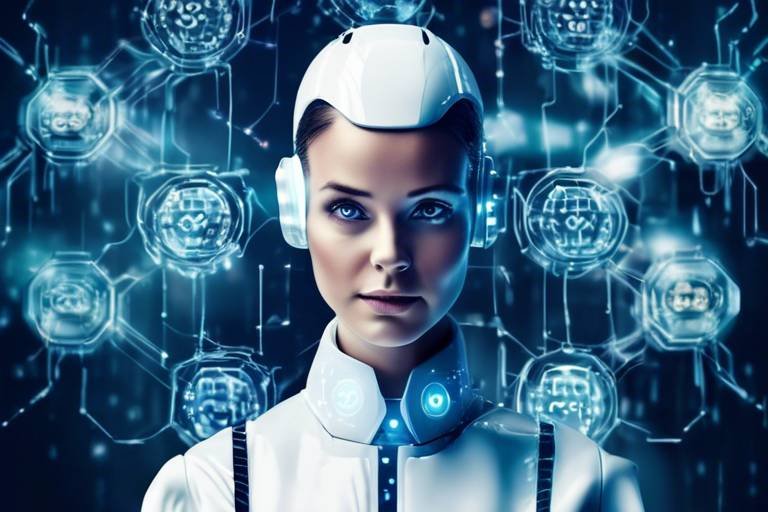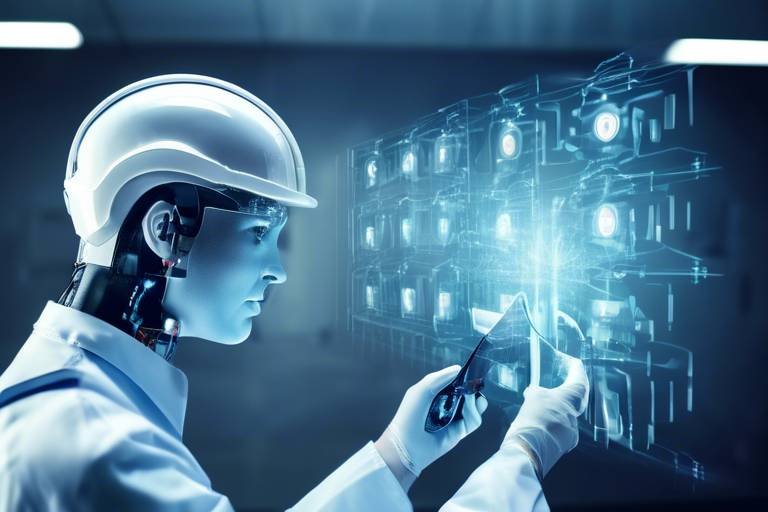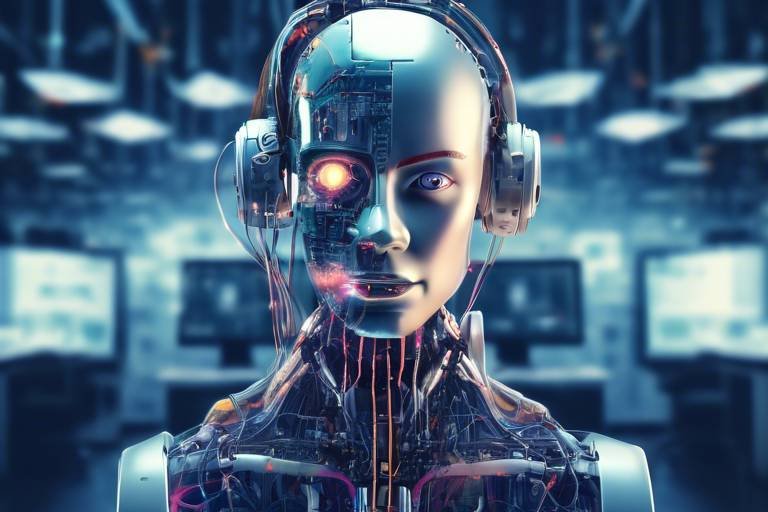Discussing the Prospects of AI in Future Jobs
As we stand on the brink of a technological revolution, the impact of artificial intelligence (AI) on the job market is a hot topic of discussion. It's not just about machines taking over jobs; it's about how these innovations can reshape our work lives in ways we haven't even begun to imagine. Think of AI as a powerful tool, one that can enhance our capabilities rather than merely replace them. In this article, we'll explore the multifaceted landscape of AI's influence on future employment, uncovering both the opportunities and the challenges that lie ahead.
AI technology is not just a buzzword; it’s increasingly being integrated into various sectors, transforming traditional job roles and creating new opportunities for innovation and efficiency. Imagine walking into an office where mundane tasks are handled by intelligent systems, allowing employees to focus on the creative aspects of their work. This is not science fiction; it’s happening right now. From customer service chatbots to advanced data analysis tools, AI is revolutionizing how businesses operate. As we embrace this technology, we must also prepare for a workforce that is more adaptable and skilled in leveraging these AI tools for maximum productivity.
One of the most debated topics regarding AI is its dual role in job creation and displacement. While it’s true that AI can automate certain tasks, leading to job loss in some sectors, it also has the potential to create entirely new job categories. This complex landscape can be likened to a double-edged sword; on one side, we have the risk of displacement, and on the other, the promise of new opportunities. For instance, as routine tasks are automated, roles focused on AI management, development, and maintenance will emerge, requiring a workforce that is prepared to adapt. This transition necessitates a shift in how we view employment—no longer can we think of jobs as static; they are evolving.
As AI continues to evolve, new roles will emerge that focus on managing and developing these technologies. Professionals will be needed who can bridge the gap between human creativity and machine efficiency. Here are a few of the roles that will likely gain prominence:
- AI Trainers and Developers: These are the professionals who train AI systems and develop algorithms. With the demand for AI solutions skyrocketing, the need for individuals with specialized skills in programming and data analysis will be critical.
- Ethics and Compliance Officers: As AI becomes more integrated into various industries, there will be a growing need for professionals who ensure ethical standards and compliance in AI implementations. This role is vital to prevent misuse and ensure that AI technologies serve the greater good.
To adapt to this rapidly changing job landscape, workers will need to engage in reskilling and upskilling initiatives. This means learning new skills or enhancing existing ones to stay competitive in an AI-driven economy. Companies will play a crucial role in this transition, as they need to invest in employee training programs that focus on the skills of the future. The question is, are we ready to embrace lifelong learning?
The integration of AI may enhance job quality by reducing repetitive tasks, allowing employees to focus on more creative and strategic aspects of their roles. Imagine a world where employees spend less time on mundane tasks and more time brainstorming innovative ideas. This shift not only improves productivity but also enhances job satisfaction.
AI tools can help streamline workflows and improve work-life balance. By automating routine tasks, employees can manage their time and responsibilities more effectively. Picture this: instead of clocking in late due to a backlog of emails, you can finish your work efficiently and leave the office on time. This balance can lead to happier employees and a healthier workplace culture.
The potential for AI to enhance job satisfaction lies in its ability to empower employees by eliminating mundane tasks. When workers are freed from the shackles of repetitive duties, they can engage in more meaningful work, fostering greater job satisfaction and overall engagement. It’s like giving a painter a blank canvas instead of a color-by-number kit—suddenly, their creativity can flourish!
While AI may automate certain tasks, it also creates new job opportunities that require different skill sets. The key is to adapt and evolve.
Skills in programming, data analysis, and AI management will be crucial, along with soft skills like creativity and problem-solving.
Companies should invest in training programs that focus on reskilling and upskilling their employees to prepare them for the future.

The Rise of AI in the Workplace
Artificial Intelligence (AI) is not just a futuristic concept anymore; it has firmly planted its roots in the workplace, reshaping how we approach our daily tasks and responsibilities. Imagine walking into your office and having a virtual assistant that can manage your calendar, prioritize your emails, and even draft reports for you. Sounds like something out of a sci-fi movie, right? But this is the reality we are stepping into. AI technology is being integrated into various sectors, from healthcare to finance, fundamentally transforming traditional job roles and creating new avenues for innovation and efficiency.
As organizations strive to stay competitive, the adoption of AI has become a necessity rather than a choice. Companies are leveraging AI to analyze massive amounts of data, streamline operations, and enhance customer experiences. For instance, in the retail industry, AI algorithms predict consumer behavior, helping businesses stock their shelves with the right products at the right time. In healthcare, AI is being used to assist doctors in diagnosing diseases more accurately and swiftly. This integration not only reduces human error but also allows professionals to focus on what they do best—caring for patients or creatively solving problems.
However, this rise of AI in the workplace isn't without its challenges. While it opens doors to unprecedented efficiency, it also raises questions about job security and the future of work. Many fear that as AI takes over repetitive and mundane tasks, the human workforce may be sidelined. Yet, it's essential to recognize that AI is not here to replace us but to augment our capabilities. Think of AI as a powerful tool that can handle the heavy lifting, allowing us to channel our energy into more strategic and creative endeavors.
Moreover, the rise of AI is creating a demand for new skills and roles that were previously non-existent. The job market is evolving, and with it comes the need for a workforce proficient in AI technologies. This shift means that workers must adapt and embrace lifelong learning to stay relevant. Companies are beginning to invest in training programs that equip their employees with the necessary skills to work alongside AI. The future of work is not just about coexisting with machines; it's about collaboration and leveraging technology to achieve greater outcomes.
In summary, the rise of AI in the workplace is a double-edged sword. On one side, it presents incredible opportunities for efficiency and innovation, while on the other, it poses challenges that require us to rethink our approach to work. As we navigate this exciting yet uncertain landscape, it's crucial to stay informed and adaptable. After all, the true power of AI lies not in its ability to replace us, but in its potential to empower us to reach new heights.

Job Creation vs. Job Displacement
The conversation around artificial intelligence (AI) often revolves around a central theme: the balance between job creation and job displacement. As AI technology continues to evolve, it’s crucial to understand how it affects employment across various sectors. On one hand, AI can automate routine tasks, potentially leading to the elimination of certain job roles. On the other hand, it creates a plethora of new opportunities and positions that did not exist before. So, how do we navigate this complex landscape?
To illustrate, let’s consider a few key factors at play:
- Automation of Repetitive Tasks: AI excels at automating mundane and repetitive tasks. For instance, roles in manufacturing and data entry are increasingly being replaced by machines and algorithms. This can lead to significant job displacement as companies seek to cut costs and improve efficiency.
- Creation of New Job Categories: While some jobs may vanish, the rise of AI also paves the way for entirely new job categories. Think about how the advent of the internet gave birth to roles like social media managers and SEO specialists. Similarly, AI will demand professionals who can develop, manage, and maintain these advanced systems.
- Hybrid Roles: Many traditional roles will evolve into hybrid positions that require both human and AI collaboration. For example, customer service representatives may work alongside AI chatbots, focusing on complex queries while the bots handle basic inquiries.
According to a recent study, approximately 85 million jobs could be displaced by a shift in labor between humans and machines by 2025. However, this same study predicts that 97 million new roles could emerge that are more adapted to the new division of labor. This indicates a net gain in employment opportunities, but it also emphasizes the need for reskilling and upskilling to ensure workers can transition into these new roles.
So, what does this all mean for the future workforce? It suggests a period of significant transformation where adaptability will be key. Workers will need to embrace lifelong learning to stay relevant in an AI-driven economy. Organizations, too, must invest in training programs to help their employees transition smoothly into new roles that AI technology creates.
In conclusion, while the fear of job displacement is valid, it is essential to look at the broader picture. The emergence of AI is not just about taking jobs away; it’s also about creating a future where new opportunities can flourish. The challenge lies in how we prepare for this shift and ensure that the workforce is equipped to thrive in a world where AI plays an increasingly vital role.

Emerging Job Roles
As we navigate the ever-evolving landscape of artificial intelligence, it's clear that the job market is undergoing a significant transformation. The traditional roles we once knew are being redefined, and new job categories are sprouting up like wildflowers in spring. This shift is not just about replacing existing jobs; it's about creating exciting opportunities that require a fresh set of skills. Imagine a world where your job title reflects your ability to work alongside AI rather than compete against it. Sounds intriguing, right?
One of the most notable emerging job roles is that of AI Trainers. These professionals are tasked with teaching AI systems how to perform specific tasks, ensuring that they learn accurately and efficiently. Think of them as the educators of the digital age, responsible for guiding AI through complex scenarios and helping it understand the nuances of human behavior. The demand for AI trainers will only increase as companies seek to integrate AI into their operations seamlessly.
Another exciting role on the horizon is that of AI Developers. These tech-savvy individuals will be responsible for creating algorithms and building the frameworks that power AI applications. Just as a chef creates a recipe, AI developers will concoct innovative solutions that drive efficiency and creativity in various industries. With the right programming skills and a knack for problem-solving, AI developers will be at the forefront of this technological revolution.
Moreover, as AI becomes more prevalent, we will see a rising need for Ethics and Compliance Officers. These professionals will play a crucial role in ensuring that AI systems are developed and implemented ethically. With great power comes great responsibility, and the potential for AI to impact society is immense. Ethics officers will help navigate the complex moral landscape of AI, ensuring that businesses adhere to ethical standards and comply with regulations. This role will require a blend of technical knowledge and ethical reasoning, making it both challenging and rewarding.
In addition to these roles, we can expect to see positions dedicated to Data Analysts who will interpret the vast amounts of data generated by AI systems. These analysts will be crucial in helping organizations make data-driven decisions, turning raw data into actionable insights. The ability to analyze and interpret data will be a highly sought-after skill as businesses strive to leverage AI for competitive advantage.
As we look to the future, it's essential to recognize that these emerging job roles will not only require technical expertise but also a strong foundation in soft skills. Communication, teamwork, and adaptability will be vital as professionals collaborate with AI systems and each other. The job market will increasingly value individuals who can bridge the gap between technology and human interaction.
In summary, the rise of AI is set to create a plethora of new job opportunities that challenge the conventional understanding of work. By embracing the changes and preparing for the emerging roles, workers can position themselves at the forefront of this exciting new era. The key will be to stay informed, continuously learn, and adapt to the shifting demands of the job market.
- What are some examples of emerging job roles due to AI? Emerging roles include AI Trainers, AI Developers, Ethics and Compliance Officers, and Data Analysts.
- How can I prepare for a job in the AI field? Consider pursuing education in data science, programming, and ethics, along with gaining experience through internships or projects.
- Will AI replace all jobs? While AI may automate certain tasks, it will also create new job opportunities that require human skills and creativity.
- What skills will be most important in the future job market? Technical skills in AI and data analysis, along with soft skills like communication and adaptability, will be crucial.

AI Trainers and Developers
The demand for is skyrocketing as organizations increasingly recognize the transformative power of artificial intelligence. These professionals play a crucial role in shaping the future of AI technologies, ensuring that they are not just effective but also ethical and reliable. Imagine a world where machines learn from their experiences and improve over time—this is where AI trainers step in. They are the educators of the AI realm, teaching systems how to process information, recognize patterns, and make decisions based on data.
AI trainers are responsible for feeding vast amounts of data into AI systems, allowing them to learn and adapt. This process requires a deep understanding of both the technology involved and the specific industry context. For instance, an AI trainer working in healthcare might focus on training algorithms to identify medical conditions from imaging data, while one in finance could be teaching systems to recognize fraudulent transactions. The versatility of this role means that trainers must be well-versed in various subjects, making their job both challenging and rewarding.
On the other hand, AI developers are the architects behind the scenes. They design and create the algorithms that make AI systems function. This role demands a strong foundation in programming languages such as Python, Java, or R, along with a solid grasp of machine learning frameworks like TensorFlow or PyTorch. Developers not only build the systems but also continuously refine them, ensuring that they can handle the complexities of real-world applications. With the rapid pace of technological advancement, these professionals must stay ahead of the curve, constantly learning and adapting.
Here's a quick overview of the skills essential for AI trainers and developers:
| Role | Key Skills |
|---|---|
| AI Trainer |
|
| AI Developer |
|
As the landscape of work continues to evolve, the need for skilled AI trainers and developers will only grow. Companies are investing heavily in AI technologies, and they need experts who can help them navigate this complex terrain. This presents a golden opportunity for those looking to enter the tech field. The future is bright for individuals equipped with the right skills, as they will not only find numerous job openings but also command competitive salaries.
In conclusion, the roles of AI trainers and developers are pivotal in the ongoing AI revolution. They are the ones who ensure that AI systems are not just tools but intelligent partners in various sectors. As we look ahead, embracing these roles could be a game-changer for many, paving the way for a new era of innovation and efficiency.
Q1: What qualifications do I need to become an AI trainer or developer?
A1: Typically, a degree in computer science, data science, or a related field is beneficial. Additionally, experience in programming and machine learning is crucial for developers, while trainers should have a strong understanding of data analysis and industry knowledge.
Q2: Are there specific industries that require more AI trainers and developers?
A2: Yes, industries such as healthcare, finance, and technology are particularly in need of AI expertise as they increasingly adopt AI solutions for various applications.
Q3: How can I stay updated with the latest trends in AI?
A3: Engaging in continuous learning through online courses, attending industry conferences, and following AI research publications can help you stay current in this rapidly evolving field.

Ethics and Compliance Officers
As we dive deeper into the age of artificial intelligence, the role of is becoming increasingly vital. These professionals are not just the gatekeepers of ethical standards; they are the architects of a framework that ensures AI technologies are implemented responsibly. Imagine a world where AI systems operate seamlessly, but without the oversight of ethical guidelines—this could lead to disastrous consequences. Therefore, the demand for Ethics and Compliance Officers is skyrocketing, as industries recognize the importance of maintaining public trust and adhering to legal regulations.
Ethics and Compliance Officers are tasked with a variety of responsibilities that include:
- Developing ethical guidelines for AI use within organizations.
- Monitoring AI systems to ensure they comply with established ethical standards.
- Conducting audits to assess the impact of AI on privacy and data security.
- Training employees on ethical AI practices and compliance requirements.
In a world where AI can make decisions that affect people's lives, these officers play a crucial role in safeguarding against biases and ensuring that AI systems are fair and transparent. For example, consider a hiring algorithm that unfairly favors certain demographics. An Ethics and Compliance Officer would step in to evaluate this system, recommending adjustments to ensure fairness and equity in hiring practices.
The skill set required for this role is unique and multifaceted. Professionals in this field must possess a deep understanding of both technology and ethics, as well as strong communication skills to articulate their findings and recommendations to stakeholders. They often collaborate with data scientists, legal teams, and upper management to create policies that not only comply with regulations but also align with the organization’s values.
As AI continues to evolve, the responsibilities of Ethics and Compliance Officers will likely expand. They will need to stay ahead of emerging technologies and anticipate ethical dilemmas that may arise. This proactive approach will be essential in shaping a future where AI is not just efficient but also responsible and ethical. In essence, these officers will serve as the moral compass of AI, guiding organizations toward a future where technology and ethics go hand in hand.
Q: What qualifications do I need to become an Ethics and Compliance Officer in AI?
A: Typically, a bachelor's degree in a relevant field such as law, ethics, or computer science is required, along with experience in compliance or ethics roles. Advanced certifications in AI ethics can also be beneficial.
Q: How does an Ethics and Compliance Officer impact AI development?
A: They ensure that AI systems are designed and operated in a way that is ethical, fair, and compliant with regulations, thus protecting both the organization and its stakeholders.
Q: What are common ethical concerns in AI?
A: Common concerns include bias in algorithms, privacy issues, data security, and the potential for job displacement.

Reskilling and Upskilling the Workforce
As we stand at the crossroads of a technological revolution, the need for reskilling and upskilling the workforce has never been more critical. The rapid advancement of artificial intelligence (AI) is reshaping industries, and with it comes the necessity for workers to adapt to new roles and responsibilities. Imagine a world where your job description changes overnight because of a new AI tool—sounds daunting, right? But fear not! This is where reskilling and upskilling come into play, acting as the lifeline for employees navigating this shifting landscape.
Reskilling involves learning new skills to take on different roles, while upskilling focuses on enhancing existing capabilities. Both are essential for staying relevant in an AI-driven job market. For instance, a factory worker might need to learn how to operate advanced machinery equipped with AI systems, while a marketing professional may need to become proficient in data analytics to interpret consumer behavior better. The key is to embrace this change rather than resist it. Companies are increasingly recognizing the value of investing in their employees' growth, creating a culture of continuous learning.
Moreover, educational institutions and online platforms are stepping up to the plate, offering courses tailored to meet the demands of the evolving job market. These programs often focus on critical thinking, problem-solving, and technical skills that are essential in the age of AI. For example, platforms like Coursera and Udacity provide specialized courses in AI, machine learning, and data science, allowing individuals to gain the expertise needed to thrive in new job roles.
To illustrate the importance of reskilling and upskilling, consider the following table that highlights the top skills needed for future jobs influenced by AI:
| Skill | Description |
|---|---|
| Data Analysis | The ability to interpret and analyze data to make informed decisions. |
| AI Management | Skills in overseeing AI systems and ensuring they align with business goals. |
| Cybersecurity | Knowledge of protecting systems and networks from digital attacks. |
| Soft Skills | Interpersonal skills like communication, teamwork, and adaptability. |
As we move forward, it's crucial for both employers and employees to prioritize these skills. Companies should offer training programs that not only focus on technical skills but also foster a culture of innovation and creativity. This way, employees can engage in projects that utilize their newfound skills, making their work both fulfilling and impactful.
In conclusion, reskilling and upskilling are not just buzzwords; they are essential strategies for thriving in a world increasingly dominated by AI. By embracing lifelong learning and adapting to new technologies, workers can not only secure their positions but also pave the way for exciting career opportunities that lie ahead. So, are you ready to invest in your future?
- What is the difference between reskilling and upskilling?
Reskilling refers to learning new skills for a different job role, while upskilling means enhancing existing skills for the same role. - Why is reskilling important in the age of AI?
As AI transforms industries, reskilling is essential for workers to adapt to new job demands and remain competitive. - How can I find reskilling and upskilling opportunities?
Many online platforms, community colleges, and professional organizations offer courses and training programs tailored to current job market needs.

AI's Impact on Job Quality
As we navigate through the evolving landscape of employment, one of the most significant questions we face is how artificial intelligence (AI) will impact job quality. The integration of AI into the workplace is not just about automation; it’s fundamentally about transforming the way we work and the quality of our jobs. Imagine a world where mundane tasks are handled by machines, freeing up human workers to engage in more creative and strategic endeavors. This shift can lead to a more fulfilling work experience, where employees feel empowered and motivated.
AI has the potential to enhance job quality in several profound ways. For instance, by taking over repetitive tasks, AI allows employees to focus on projects that require critical thinking and innovation. Instead of spending countless hours on data entry or routine analysis, workers can dedicate their time to brainstorming new ideas or improving existing processes. This shift not only boosts productivity but also increases job satisfaction, as employees feel their skills are being utilized effectively.
Moreover, the introduction of AI tools can significantly improve work-life balance. Imagine having a virtual assistant that schedules your meetings, manages your emails, and even reminds you of deadlines. This kind of technology can streamline workflows, making it easier for employees to manage their time and responsibilities. As a result, workers can enjoy a more balanced life, reducing stress and enhancing overall well-being. The ability to step away from work without the nagging feeling of unfinished tasks can lead to greater job satisfaction and a healthier lifestyle.
Another critical aspect of AI's impact on job quality is its potential to foster greater employee engagement. When AI takes care of mundane tasks, employees can shift their focus to more meaningful work. This not only increases job satisfaction but also encourages a culture of innovation within organizations. Employees who feel engaged and valued are more likely to contribute positively to their teams, leading to better overall performance and a more vibrant workplace environment.
However, it’s essential to recognize that the integration of AI is not without its challenges. There is a risk that some employees may feel threatened by AI, fearing that their roles could become obsolete. This fear can lead to anxiety and decreased job satisfaction. Therefore, it’s crucial for organizations to address these concerns proactively. Providing training and support for employees to adapt to new technologies is vital. By fostering a culture of continuous learning, companies can help their workforce embrace AI as a tool for enhancement rather than a replacement.
In conclusion, while the rise of AI presents challenges, it also offers incredible opportunities to enhance job quality. By reducing repetitive tasks, improving work-life balance, and fostering greater engagement, AI has the potential to transform the workplace into a more satisfying and productive environment. As we move forward, it will be essential for both employers and employees to navigate these changes thoughtfully, ensuring that the integration of AI leads to a brighter future for all.
- How will AI improve job satisfaction? AI can take over mundane tasks, allowing employees to focus on more meaningful work, which increases job satisfaction.
- Can AI help with work-life balance? Yes, AI tools can streamline tasks, making it easier for employees to manage their time effectively.
- What are the risks associated with AI in the workplace? The primary risk is job displacement, as some roles may become obsolete. However, reskilling can mitigate this risk.
- How can companies prepare their workforce for AI integration? Companies should invest in training and support initiatives to help employees adapt to new technologies.

Work-Life Balance Improvements
In today's fast-paced world, achieving a healthy work-life balance can feel like an uphill battle. With the rise of artificial intelligence, however, there’s a glimmer of hope on the horizon. AI tools are not just about automating mundane tasks; they are designed to enhance our overall productivity and well-being. Imagine a scenario where tedious, repetitive tasks are handled by intelligent systems, freeing up precious time for employees to focus on what truly matters—be it personal projects, family time, or simply unwinding after a long day. This shift could lead to a more fulfilling professional life, where individuals can engage deeply in their work without sacrificing their personal lives.
AI can streamline workflows by organizing schedules, prioritizing tasks, and even providing reminders for important deadlines. This means that employees can spend less time juggling multiple responsibilities and more time engaging in meaningful activities. For instance, consider how AI-powered scheduling assistants can sync with personal calendars, suggesting optimal times for meetings that align with both work obligations and personal commitments. The result? A smoother day-to-day experience where stress is minimized, and productivity is maximized.
Moreover, the integration of AI in the workplace can lead to improved communication and collaboration among teams. With tools that analyze communication patterns and suggest best practices, employees can work more effectively together, reducing misunderstandings and enhancing teamwork. This fosters a sense of community and support within the workplace, which is essential for maintaining a positive work environment. When employees feel connected to their colleagues, they are more likely to enjoy their work and feel satisfied with their roles.
It's also important to highlight that AI can help in the realm of mental health. As workplace stress continues to be a significant concern, AI-driven wellness programs can provide personalized recommendations for stress management, mindfulness exercises, and even virtual therapy sessions. This proactive approach to mental health can empower employees to take charge of their well-being, leading to a healthier, more balanced life.
To summarize, the potential of AI to improve work-life balance is immense. By automating routine tasks, enhancing communication, and supporting mental health initiatives, AI not only makes work more enjoyable but also allows employees to reclaim their time. As we navigate this evolving landscape, it’s crucial for organizations to embrace these technologies, ensuring that they are used to foster a culture of well-being and balance. After all, a happy employee is a productive employee, and in an AI-driven world, this balance is more attainable than ever.
- How can AI improve my work-life balance? AI can automate repetitive tasks, optimize scheduling, and provide wellness resources, allowing you more time for personal activities.
- Are there any downsides to relying on AI for work-life balance? While AI offers many benefits, it's essential to ensure that technology doesn't replace human interaction and that employees remain engaged with their teams.
- What skills do I need to adapt to an AI-driven workplace? Skills in data analysis, programming, and emotional intelligence will be valuable as AI continues to evolve.

Job Satisfaction and Engagement
In today's fast-paced world, where the hum of technology intertwines with our daily lives, job satisfaction has become a pivotal factor in determining not just employee retention but also overall productivity. Imagine waking up every morning excited about the tasks ahead, feeling a sense of purpose in your work. This is where artificial intelligence (AI) steps in, acting as a catalyst for change. By automating mundane tasks, AI empowers employees to focus on what truly matters—innovation, creativity, and strategic thinking.
When repetitive tasks are taken off the table, employees can redirect their energies towards more meaningful projects. Think about it: Would you rather spend your day sifting through endless data or brainstorming the next big idea? AI's ability to handle the drudgery not only boosts efficiency but also enhances job satisfaction. According to recent studies, companies that have integrated AI into their workflows report higher engagement levels among employees, as they feel more valued and connected to their work.
Moreover, AI can provide personalized feedback and insights, allowing employees to track their performance and growth. This level of engagement can lead to a more fulfilling work experience. For instance, AI-driven tools can analyze individual contributions and suggest areas for improvement, fostering a culture of continuous learning. When employees see that their growth is being actively supported, their commitment to the organization deepens.
But it's not just about individual satisfaction; the ripple effects can transform entire teams and organizations. A workplace that prioritizes engagement often sees:
- Increased Collaboration: Employees are more likely to collaborate when they feel fulfilled, leading to innovative solutions and a stronger team dynamic.
- Lower Turnover Rates: Satisfied employees are less likely to jump ship, saving companies the high costs associated with recruitment and training.
- Enhanced Company Culture: A focus on engagement fosters a positive environment where employees feel supported and valued.
Ultimately, as AI continues to evolve, it will play a crucial role in shaping the future of work. By freeing employees from the shackles of monotonous tasks, AI not only enhances job satisfaction but also cultivates a workforce that is engaged, motivated, and ready to tackle the challenges of tomorrow. In this new era, the question isn't whether AI will impact job satisfaction, but rather how we can harness its potential to create a more enriching workplace for everyone.
Q: How does AI improve job satisfaction?
A: AI improves job satisfaction by automating repetitive tasks, allowing employees to focus on more meaningful and creative aspects of their work, thus enhancing their overall engagement.
Q: Will AI replace jobs entirely?
A: While AI may automate certain tasks, it is also expected to create new job roles that require different skills, leading to a dynamic job landscape rather than outright job loss.
Q: What new job roles will emerge due to AI?
A: New job roles such as AI trainers, developers, and ethics compliance officers are expected to emerge as AI technology evolves, requiring specialized skills in programming, data analysis, and ethical governance.
Q: How can employees prepare for an AI-driven workplace?
A: Employees can prepare by engaging in reskilling and upskilling initiatives, focusing on developing technical skills and soft skills that complement AI technologies.
Frequently Asked Questions
- What is the impact of AI on future jobs?
AI is transforming the job landscape by automating repetitive tasks, which can lead to both job displacement and the creation of new roles. As industries adapt, workers may find opportunities in managing and developing AI technologies.
- Will AI create more jobs than it displaces?
While AI may displace certain jobs, it also has the potential to create entirely new job categories. The balance between job creation and displacement will depend on how industries evolve and how workers adapt to new technologies.
- What new job roles are emerging due to AI?
Emerging job roles include AI trainers, developers, and ethics compliance officers. These positions require specialized skills in programming, data analysis, and a strong understanding of ethical standards in AI implementations.
- How can workers prepare for changes in the job market?
Workers can prepare by engaging in reskilling and upskilling initiatives. Learning new technologies, enhancing their skill sets, and embracing lifelong learning will help them stay competitive in an AI-driven economy.
- Can AI improve job quality?
Yes, AI can enhance job quality by taking over mundane tasks, allowing employees to focus on more creative and strategic aspects of their work. This shift can lead to greater job satisfaction and engagement.
- How does AI affect work-life balance?
AI tools can streamline workflows and improve work-life balance by automating time-consuming tasks. This enables employees to manage their time more effectively and reduce stress associated with workload.
- Will AI increase job satisfaction?
AI has the potential to increase job satisfaction by empowering employees to engage in meaningful work. By eliminating repetitive tasks, workers can focus on creative solutions and innovative projects that enhance their job experience.





